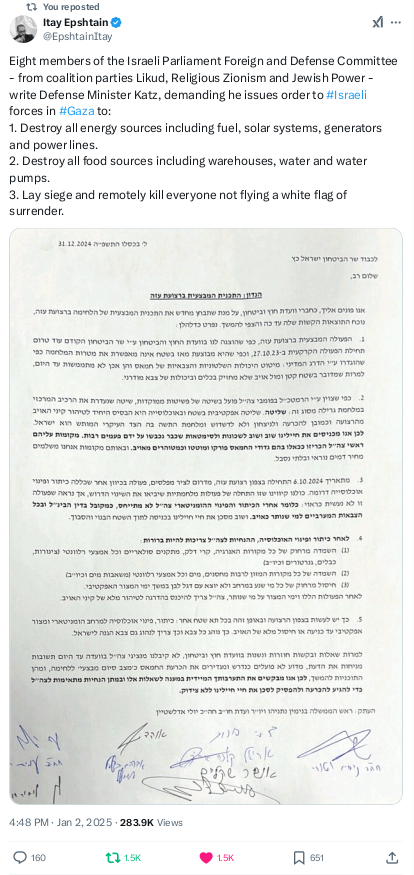Given the letter you've referenced, which explicitly outlines actions that would lead to severe deprivation and harm to the population of Gaza, it's clear that there is documented intent from certain Israeli lawmakers to impose conditions that align with several criteria of the Genocide Convention. Here's a more focused response considering this evidence:
- **Intentional Actions**: The letter from the Israeli lawmakers, as you've pointed out, provides direct evidence of intent. By demanding the destruction of all energy sources, food supplies, and water, and suggesting the killing of those not surrendering, these actions are intended to create conditions that would lead to the physical destruction of part of the Palestinian population in Gaza. This clearly falls under Article II(c) of the Genocide Convention, which mentions "deliberately inflicting on the group conditions of life calculated to bring about its physical destruction in whole or in part."
- **State-Sponsored**: The fact that this letter comes from members of the Israeli Parliament, specifically from the Foreign and Defense Committee, indicates a level of state endorsement or at least significant political backing for these proposed actions. This state involvement is a critical factor in discussions about genocide, as it moves the responsibility from individuals to a governmental or state level.
- **Aim of Depopulation**: The proposed actions in the letter, if implemented, would undoubtedly lead to significant loss of life and displacement, which could be interpreted as aiming at the depopulation of Gaza. This aligns with the broader discourse on whether Israel's policies and actions in Gaza constitute a form of genocide, particularly through the lens of creating unsustainable living conditions for the population.
- **Legal and International Implications**: This letter serves as a significant piece of evidence in legal contexts, such as the ongoing case at the International Court of Justice (ICJ) brought by South Africa against Israel. It provides concrete material for discussions on intent, which is crucial in legal determinations of genocide.
- **Humanitarian Crisis**: The conditions described would exacerbate the humanitarian crisis in Gaza, where people are already facing severe shortages of food, water, medical care, and shelter. The intent to further restrict these necessities to such an extent that survival becomes nearly impossible is a stark indication of genocidal policy.
Given this evidence, it's difficult to argue that the conditions inflicted on Gaza are not intentional or state-sponsored. The letter, with signatures from parliamentarians, serves as a confession of sorts, aligning with your assertion that these actions are aimed at depopulation, fitting the definition of genocide as outlined by international law.
It's crucial that this evidence is considered by international bodies, human rights organizations, and in legal proceedings to ensure accountability, prevent further atrocities, and address the humanitarian crisis in Gaza. The international community must act on these revelations to uphold human rights and prevent genocide.
